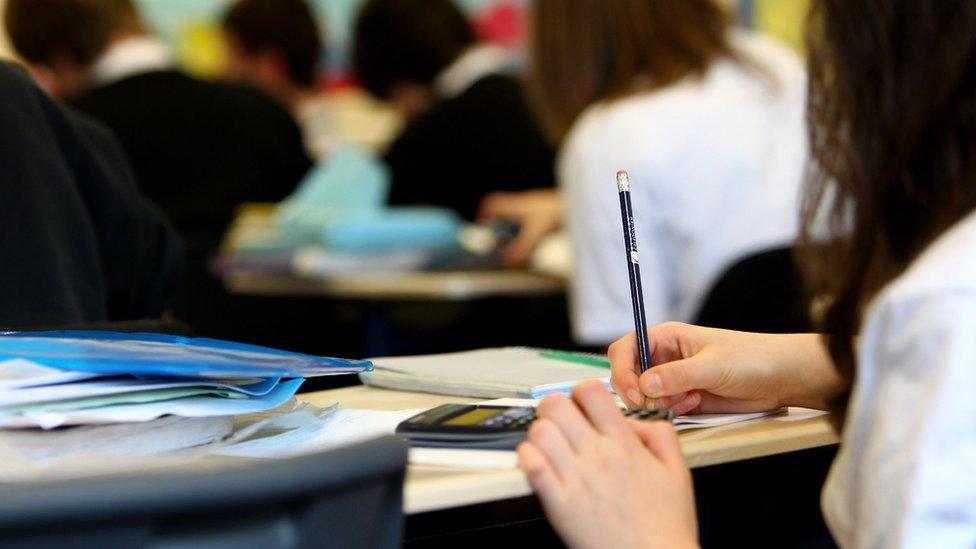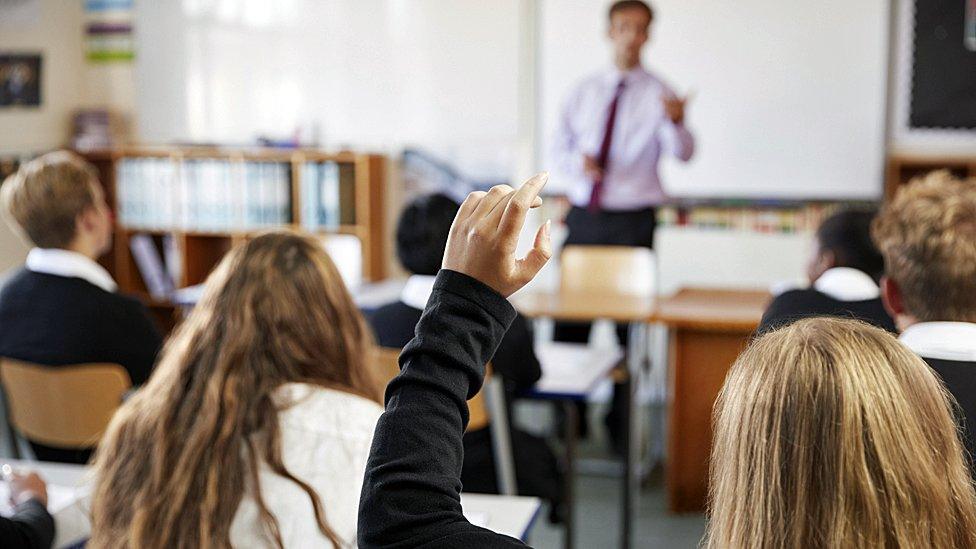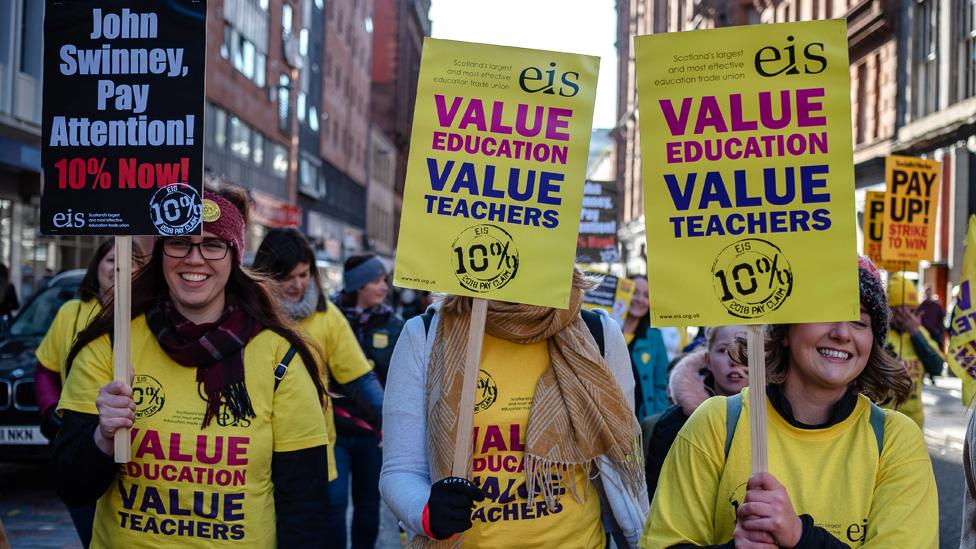Teachers' union 'hopeful' of new offer to avert strike
- Published
The EIS general secretary said they are hopeful of a new pay offer.
Scotland's largest teaching union is confident a new pay offer will be made to avert a teacher's strike on Thursday but is still preparing to take action that will close most schools.
Teachers across the country are due to stage a 24-hour walkout after rejecting a 5% pay increase, calling for 10%.
EIS general secretary Andrea Bradley said the union was "hopeful" of a new offer and was prepared to negotiate.
"We are ready to consider a new offer as soon as it comes to us," she said.
Deputy First Minister John Swinney previously said there was no more money to fund public sector pay rises.
It followed Scotland's largest nursing union voting to go on strike for the first time ever in a dispute over pay.
Further EIS strike dates have been set for 10 January in primary schools and 11 January in secondary schools. The Scottish Secondary Teachers' Association (SSTA) is also considering taking strike action in the week beginning 5 December.
Ms Bradley told BBC Scotland's Sunday Show she was very hopeful there would be a new offer having been in informal discussions with the Scottish government.
'A more substantial offer'
But she said that as things stood, there had not been any new offer since the previous one was rejected in September so the strike would be going ahead as planned.
"As things stand, the EIS continues to plan for a day of national strike action on Thursday which is likely to close almost all schools in Scotland," she said.
"We are hopeful however, that over the course of this weekend Scottish government and Cosla colleagues will have been able to have arrived at an agreement around a more substantial offer than the 5% that was rejected in the the middle of September.
"We are ready to consider a new offer as soon as it comes to us at the beginning of the working work."

Ms Bradley said the union's salaries committee had scheduled a meeting for Tuesday and another meeting of its executive committee planned for Wednesday.
"So we are more than ready to consider any offer that comes forward from the Scottish government and Cosla over the course of the next couple of days," she said.
"Of course we are prepared to negotiate. We have been negotiating around this since April."
She pointed out that when the EIS claim for a 10% increase was lodged, inflation was at 7% but was now at 11.1%.
"So a 10% pay award would be a 1.1% real terms pay cut and that's against the backdrop of teachers salaries being eroded to the tune of 25% since 2008," she said.
She told the programme the union would not like to see any cuts to the education budget.
"Should that occur the responsibility for that will very much lie with the Scottish government, not with teachers and not with the EIS who are quite rightly looking to protect the living standards of teachers as hard-working public sector workers," she said.
"When you underfund education it is ultimately the children and young people who will be disadvantaged."
Teachers using food banks
She said that as teachers had not received any pay increase yet they were struggling to meet the cost of food, fuel, energy and housing and some members were now using food banks.
John Swinney announced £615m of spending cuts in his emergency budget review earlier this month.
It came on top of £560m cuts to public services in September.
Ms Bradley said the EIS understood the position the Scottish government was in but said it had known well in advance that there was going to be a substantial teacher pay claim coming this year.
"They knew to expect this and yet they haven't planned adequately for it so the responsibility rests with the Scottish government," she said.
The Scottish government has said it is "committed to supporting a fair pay offer" through the Scottish Negotiating Committee for Teachers - the body that negotiates pay and conditions of service.
Education Secretary Shirley-Anne Somerville said: "We are absolutely committed to supporting a fair pay offer for teachers through the Scottish Negotiating Committee for Teachers, the body that negotiates their pay and conditions of service.
"I spoke to trades union representatives on Friday and restated that I am keen to work with Cosla, as the employers, to allow them to make a revised pay offer and avoid unnecessary strikes.
"I have been clear, however, that the Scottish government has a fixed budget and if we are looking to fund public sector pay offers, then that money must come from somewhere else in the budget."
'Failed to prepare'
The Scottish Conservatives education spokesman Stephen Kerr said: "Teachers are clearly sending out a message that the SNP have failed to prepare, and now they are preparing to fail as strikes will shut nearly every school in Scotland on Thursday.
"Our young pupils suffered enough disruption during the pandemic and missing out on more classroom time is the last thing they need. The buck for this imminent strike action stops with the SNP government.
"They claim education is their top priority but have failed to address these threats with any sort of urgency. There is still time for Shirley-Anne Somerville to show some leadership, get back round the table with the unions, and avoid the school gates being closed this week which will cause huge disruption across the country."
The Scottish Liberal Democrats education spokesman Willie Rennie said: "There is no doubt that these strikes will be hugely disruptive but teachers can only be pushed so far.
"Shirley-Anne Somerville should have been front and centre for months hammering out a deal between educational authorities and teachers. Instead, she hides away in St Andrews House and blames everyone but herself for these strikes."
"A pay deal needs to be reached in the next few days. If these strikes go ahead she will owe parents, teachers and pupils a public apology."
The EIS said 96% of its members backed a teachers' strike on a 71% turnout.


The prospect of the teachers' strike on Thursday will revive memories of the long-running programme of industrial action in the 1980s.
The two main teachers' unions - the EIS and the SSTA - were involved in a pay dispute which lasted for two years and which often seemed like a war of attrition between the unions and the Conservative government of the time.
Across Scotland, this dispute is often remembered because of the devastating impact a work-to-rule had on school sport.
But for some young people at the time, the impact was much more severe. As well as a few national strikes, there was a rolling programme of action targeted at secondary schools in the constituencies of government ministers.
These regular strikes at schools in some Conservative constituencies had a huge effect on the education of some young people and the school community.
EIS members at some schools went on strike regularly on Tuesdays, Wednesdays and Thursdays.
It is perhaps impossible to truly quantify the impact of these regular strikes on some students - some may even have failed exams because of lost teaching time.
Each side was acutely aware of the impact the action was having on young people and tended to blame the other for it.
The memory of this lengthy dispute - and its impact on some schools and young people - is one reason why many teachers still regard striking as a nuclear option and hope the mere threat of action now will be sufficient.
- Published17 November 2022

- Published16 November 2022

- Published10 November 2022

- Published3 November 2022

- Published5 October 2022

- Published16 September 2022
